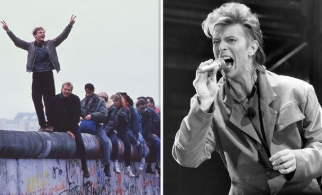David Bowie’s Berlin Era: Reinvention, Struggles, and Musical Genius
Introduction: A City of Transformation
David Bowie’s time in Berlin from 1976 to 1979 marked one of the most significant periods in his career. Fleeing the excesses of fame and addiction, he found solace in the divided city, creating some of his most groundbreaking work. The Berlin Trilogy—Low, “Heroes”, and Lodger—not only redefined his sound but also cemented his legacy as a musical innovator.
Escaping Los Angeles: The Need for Change
Before moving to Berlin, Bowie was caught in a downward spiral in Los Angeles. Struggling with drug addiction, particularly cocaine, and overwhelmed by fame, he sought a place where he could rebuild himself. Berlin, with its raw energy and artistic freedom, provided the perfect escape. With his friend and collaborator Iggy Pop, Bowie relocated to a modest apartment, aiming to rediscover his creativity and sobriety.
The Influence of Berlin: A City Divided
Berlin in the late 1970s was a city of contrasts—divided by the Wall, haunted by its past, yet alive with underground art and music scenes. This unique atmosphere influenced Bowie deeply. He immersed himself in German culture, frequenting clubs like SO36 and becoming fascinated with the experimental sounds of Krautrock bands such as Kraftwerk and Neu! These influences would shape his new musical direction.
The Berlin Trilogy: A Sonic Revolution
Bowie’s collaboration with Brian Eno and producer Tony Visconti resulted in three avant-garde albums known as the Berlin Trilogy:
- Low (1977): Marked by electronic experimentation and fragmented instrumentals, Low was unlike anything Bowie had done before. Songs like “Sound and Vision” and “Warszawa” reflected both personal introspection and the cold, industrial feel of Berlin.
- “Heroes” (1977): Perhaps the most celebrated album of the trilogy, “Heroes” captured the spirit of divided Berlin. The title track, inspired by a couple kissing by the Berlin Wall, became an anthem of hope and defiance.
- Lodger (1979): More accessible than the previous two albums, Lodger fused world music elements with Bowie’s experimental tendencies, producing hits like “Boys Keep Swinging.”
Bowie’s Lifestyle in Berlin: Anonymity and Normalcy
Unlike his extravagant existence in Los Angeles, Bowie lived a relatively low-key life in Berlin. He painted, took long walks, and rode the subway unnoticed. This period allowed him to focus on his music without the pressures of stardom. His time with Iggy Pop was also crucial, as he helped produce The Idiot and Lust for Life, reviving Pop’s career while refining his own artistic vision.
Political and Cultural Impact
Bowie’s Berlin period was not just about personal reinvention; it also held political significance. The song “Heroes” became a powerful symbol of resistance and unity, particularly in Germany. When Bowie performed it at the Reichstag in 1987, near the Berlin Wall, thousands of East Berliners gathered on the other side to listen—an event later seen as a cultural precursor to the Wall’s fall in 1989.
Legacy and Influence
Bowie left Berlin in 1979, but the city remained a defining chapter in his career. The Berlin Trilogy influenced countless artists, from U2 to Nine Inch Nails, and set the stage for electronic and ambient music’s integration into mainstream rock. Even after his passing in 2016, Bowie’s Berlin years are remembered as a testament to artistic evolution and resilience.
Conclusion: Reinvention and Artistic Freedom
David Bowie’s time in Berlin was more than just a relocation—it was a rebirth. The city gave him the space to experiment, heal, and create some of his most influential work. In many ways, Bowie’s Berlin era exemplifies the power of reinvention, proving that even at one’s lowest, there is always room for transformation and artistic greatness.


Leave a Comment